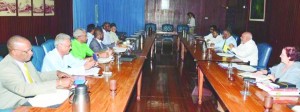
The year just gone by was one of numerous challenges for President Donald Ramotar, particularly in the face of an uncompromising political opposition, but there were some accomplishments as well.
He scored big at the People’s Progressive Party/Civic (PPP/C) 30th congress, winning the majority 886 votes, topping the list of the Party’s Central Committee.
The year 2013 commenced with the headof-state making major announcements, chief among which was a feasibility study for a new Demerara River crossing, in light of the heavy volume of traffic burdening the age-old infrastructure.
The first LIAT aircraft touched down at the Ogle International Airport that was certified an international port of entry on March 26, and as part of the ceremonial commissioning, the headof-state accompanied a delegation on a flight to Mount Roraima and back in the executive Cessna Citation XLS+.
Ogle airport
The head-of-state was pleased with the transformation of Ogle Airport, but there was disappointment over Delta airlines pulling out from the Georgetown to Miami route on profitability grounds; a rationale the government found unsubstantiated.
The situation, coupled with the suspension of EZJet’s licence following criminal charges laid against its boss, and RedJet being forced to terminate services as a result of operating costs, prompted the government to seek alternatives, leading President Donald Ramotar to enter into talks with reputable airlines.
During that period, Caribbean Airlines was granted flag carrier status, allowing it to conduct direct flights between Georgetown and New York, and Georgetown and Toronto.
The government through the Housing and Water Ministry continued its aggressive housing programme with numerous One Stop Shop exercises across the country. The president dropped in on a few to congratulate successful applicants who were on the road to owning their own home.
On several of those occasions, President Ramotar spoke of his government’s philosophy of every Guyanese having equal opportunities and realising their dreams, one of which is home ownership.
Meanwhile, residents of White Water, a small Amerindian village in the North West District, Region One and Kwatamang in Region Nine were also proud owners of their new homes under the hinterland component of the housing programme, a Government Information Agency (GINA) release said.
Some were moved to tears when the president handed over the keys, recalling the conditions under which they were living prior to the project coming to fruition.
The high-level engagement between the government and the indigenous people continued in 2013 when the seventh annual National Toshaos Council (NTC) meeting got under way. Amerindians utilised the presidential grants for income generating projects and were told that more were to be available. In November, funds were released for payment.
Land demarcation
At the opening of the NTC, the president witnessed the signing of a US$10.7 million land titling initiative between the Guyana government and the United Nations Development Programme (UNDP) for titling of 13 Amerindian communities and demarcation of 33 others.
The land titling process suffered a major setback when the political opposition cut funding from the country’s Low Carbon Development Strategy (LCDS), Guyana REDD+ Investment Fund (GRIF) projects.
Karasabai welcomed the head of state when he visited on September 7 as the South Pakaraimas community marked its heritage village celebrations.
Engagements with opposition
The political opposition continued with the same posture in 2013, slashing the country’s national budget and key priority projects, prompting reactions from all spheres in society.
The parliamentary saga continued with the opposition voting down the anti-money laundering legislation, making Guyana vulnerable to financial crimes. The president considered it the worst form of economic sabotage ever demonstrated.
Non-support
The president was most appalled by the non-support for the firearms amendment bill in the National Assembly on March 14 which sought to strengthen the laws regarding the trafficking in firearms, and trading or possession of the components of firearms
Non-support of the bill followed a string of attempts to discredit Home Affairs Minister Clement Rohee, whom the political opposition had filed a no-confidence motion against, especially since the protest action in Linden over the restructuring of the electricity tariff resulted in three deaths.
The situation had prompted a halt in the proposed electricity tariff imposition and an agreement among the government, opposition and Region 10 administration for an independent commission of inquiry into the deaths.
A five-member panel of distinguished jurists from the Caribbean led the commission which after six months of hearings and examination concluded their findings.
Minister Rohee was cleared of any involvement and compensation was recommended for the victims’ families.



